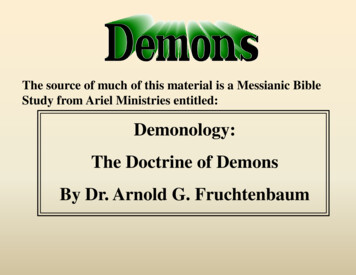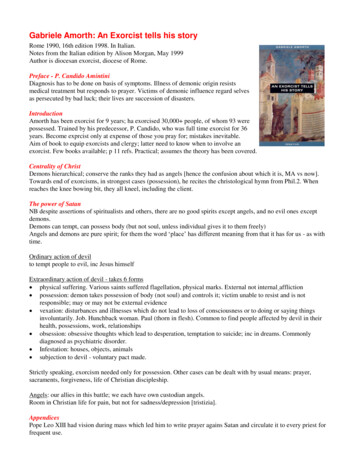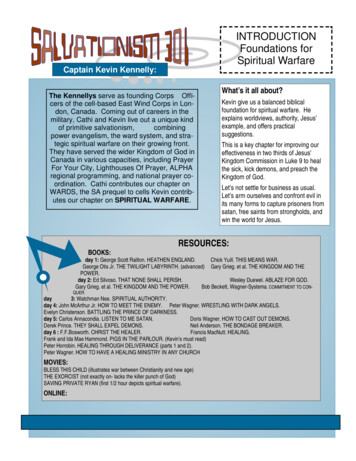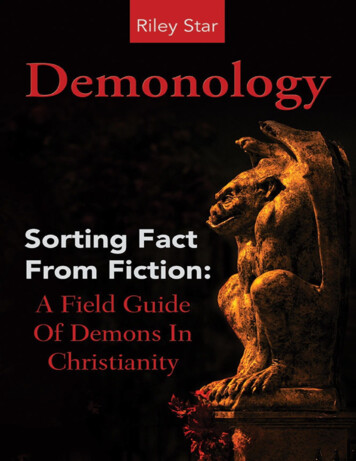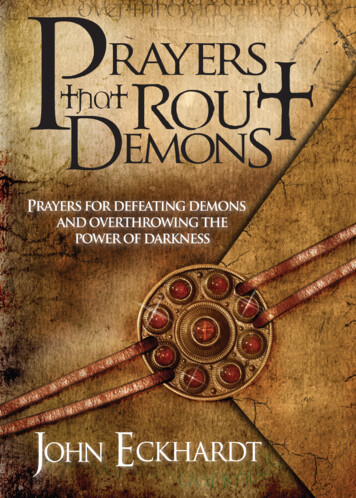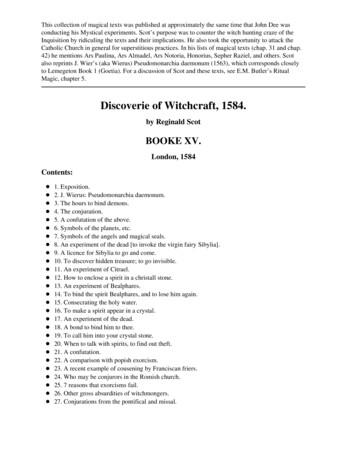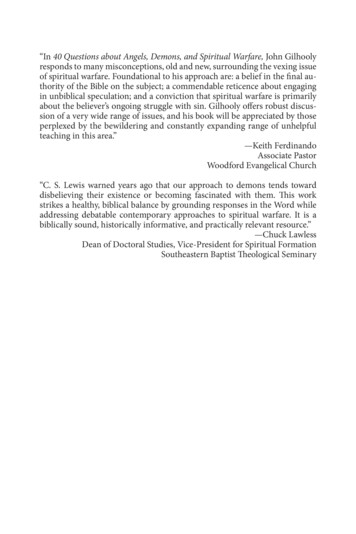
Transcription
“In 40 Questions about Angels, Demons, and Spiritual Warfare, John Gilhoolyresponds to many misconceptions, old and new, surrounding the vexing issueof spiritual warfare. Foundational to his approach are: a belief in the final authority of the Bible on the subject; a commendable reticence about engagingin unbiblical speculation; and a conviction that spiritual warfare is primarilyabout the believer’s ongoing struggle with sin. Gilhooly offers robust discussion of a very wide range of issues, and his book will be appreciated by thoseperplexed by the bewildering and constantly expanding range of unhelpfulteaching in this area.”—Keith FerdinandoAssociate PastorWoodford Evangelical Church“C. S. Lewis warned years ago that our approach to demons tends towarddisbelieving their existence or becoming fascinated with them. This workstrikes a healthy, biblical balance by grounding responses in the Word whileaddressing debatable contemporary approaches to spiritual warfare. It is abiblically sound, historically informative, and practically relevant resource.”—Chuck LawlessDean of Doctoral Studies, Vice-President for Spiritual FormationSoutheastern Baptist Theological Seminary
40QUESTIONS ABOUTAngels, Demons, andSpiritual WarfareJohn R. GilhoolyBenjamin L. Merkle, Series EditorKregelAcademic
40 Questions about Angels, Demons, and Spiritual Warfare 2018 John R. GilhoolyPublished by Kregel Academic, an imprint of Kregel Publications, 2450 Oak Industrial Dr. NE, GrandRapids, MI 49505-6020.This book is a title in the 40 Questions Series edited by Benjamin L. Merkle.All rights reserved. No part of this book may be reproduced, stored in a retrieval system, or transmitted inany form or by any means —electronic, mechanical, photocopy, recording, or otherwise—without writtenpermission of the publisher, except for brief quotations in printed reviews.All Scripture quotations, unless otherwise indicated, are from The Holy Bible, English Standard Version,copyright 2001 by Crossway Bibles, a division of Good News Publishers. Used by permission. Allrights reserved.Scripture quotations marked nasb are from the New American Standard Bible . Copyright 1960, 1962, 1963,1968, 1971, 1972, 1973, 1975, 1977 by The Lockman Foundation. Used by permission. www.Lockman.orgScripture quotations marked nrsv are from the New Revised Standard Version Bible, copyright 1989 bythe Division of Christian Education of the National Council of the Churches of Christ in the U.S.A., andare used by permission. All rights reserved.The Greek font GraecaU is available from www.linguistsoftware.com/lgku.htm, 1-425-775-1130.ISBN 978-0-8254-4468-5Printed in the United States of America18 19 20 21 22 / 5 4 3 2 1
To my wife
ContentsIntroduction / 9Part 1: Introductory Questions1. Why Is There a Fascination with the Supernatural? / 152. Are Angels and Demons Active Today? / 193. What Is Spiritual Warfare? / 23Part 2: Questions about Spiritual PowersSection A: Questions Related to Angels4. What Is Angelology? / 295. What Does the Bible Say about Angels? / 356. Do Believers Have Guardian Angels? / 417. Who Is the Angel of the Lord? / 458. Who Are the “Sons of God” in Genesis 6? / 53Section B: Questions Related to Demons9. Should We Study Demonology? / 6110. What Does the Bible Say about Demons? / 6511. Do Judaism or Islam Believe in Angels and Demons? / 7112. Are There Territorial Spirits? / 7513. Can Christians Be Demon-Possessed? / 79Section C: Questions Related to the Devil14. Who Is the Devil, or Satan? / 8715. Why Did God Create the Devil? / 9116. Why and When Did the Devil Fall from Heaven? / 9717. Does Isaiah 14 Describe the Fall of the Devil? / 10318. Does Ezekiel 28 Describe the Fall of the Devil? / 10919. What Is the Role of the Devil in Temptation? / 113
Part 3: Questions about Spiritual WarfareSection A: Questions Related to Spiritual Warfare in History20. What Does the Bible Say about Jesus and Spiritual Warfare? / 11921. How Was Spiritual Warfare Understood in the Apostolic Church? / 12322. How Was Spiritual Warfare Understood in the Ancient Church? / 12723. How Was Spiritual Warfare Understood in the Medieval Church? / 13124. How Was Spiritual Warfare Understood in the Reformation Church? / 135Section B: Questions Related to Contemporary Models of Spiritual Warfare25. What Is the World-Systems Model of Spiritual Warfare? / 14326. What Is the Strategic-Level Deliverance Model of Spiritual Warfare? / 14927. What Is the “War with the Flesh” Model of Spiritual Warfare? / 155Section C: Questions Related to Spiritual-Warfare Practices28. What Is the Full Armor of God? / 16329. What Is “Tearing Down Strongholds”? / 16930. What Is “Binding the Strong Man”? / 17331. What Is Spiritual Mapping? / 17732. What Is the Role of Prayer in Spiritual Warfare? / 18333. Should We Practice Exorcisms? / 18734. Is It Possible to Bless Objects for Spiritual Warfare? / 193Section D: Questions Related to the Occult35. What Does the Bible Say about the Occult? / 20136. What Is the New Age Movement? / 20737. What Is Wicca? / 21138. Are There Such Things as Spiritual Curses? / 21739. What Is Satanic Ritual Abuse? / 22140. What Are Tarot, Ouija, and Divination? / 227Selected Bibliography / 233Scripture Index / 235
IntroductionThis book is intended to assist Christians, pastors, and churches to thinkrightly about the nature of spiritual warfare, as well as the concomitantrealities of spiritual beings and occult practices. Writing a book about spiritual warfare involves a number of difficulties, the greatest of which is thatspiritual-warfare discussions often take place at the level of folk religion. Inother words, the language of spiritual warfare, and the questions that ariseabout its shape and practice, are often generated in local conversationsamongst church people of varying levels of study and experience. If youhappen to mention in a church setting that you are writing a book on spiritualwarfare, all manner of strange questions and anecdotes pop up. I’ve spoken topeople who claim to have seen Michael the archangel, or live in houses inhabited by demons. However, apparitions of spiritual beings, whether sincere oroccult fantasy, are not principally what I think about when I think about spiritual warfare. Neither is exorcism. I think principally about the war with sin.Of course, such differences are inevitable when working with an umbrellaterm like “spiritual warfare.” It is taken for granted that “spiritual warfare” isa term well-understood and well-attested to by the Bible. As a result, much ofour talk about spiritual warfare is unclear.Perhaps the most troubling tendency in literature on spiritual warfare,however, is the extent to which mere anecdote bears the brunt of the heavylifting. In other words, many authors on spiritual warfare treat the biblicaltexts as if they are an addendum to what they have gleaned through experience, whether in deliverance ministry or counseling sessions. In reactionto some of this excess, others reject the idea of spiritual warfare wholesale.Many books on spiritual warfare consist almost entirely of the reporting ofstories of personal experience, but experience is not self-interpreting. Thebest books on the subject fill out the contours of these reports with the data ofthe Scriptures, so that God’s Word becomes the interpreter of our experience.Even still, these are difficult and weighty matters, and we often find thatthe Bible does not answer the exact questions we find ourselves asking. Insuch instances, however, we must ask why the biblical authors chose to address other matters. Perhaps, our speculations about the spirit realm are notalways helpful and would be better off left behind. In fact, we are told veryearly that “secret things belong to the Lord our God, but the things that are9
10 Introductionrevealed belong to us and to our children forever, that we may do the words ofthis law” (Deut. 29:29). We should be satisfied with what we have been given.In any case, the paucity of data about some of these matters in Scriptureoften has the effect of leading to an overreliance on anecdote. Likewise, this leadsto another difficulty: Often we find ourselves so desperate for an answer to aquestion of curiosity that we will “find” answers in texts that simply have nothingto do with the question. Typically, authors accomplish this by allegorizing, spiritualizing, or by word association. However, these techniques are generally disrespectful to the intentions of the authors, since they erode any sense in whichthe meaning of what the author wrote is determined by the text and not our ownquestions of curiosity. To say that the text is “for us” does not mean that it is for usto do what we will; it is to say that what the author wrote is what we need to hear.These worries lead to two extreme responses to spiritual warfare. One isan incredible worry about the dark powers, and an over-suspicion about theirinvolvement in and responsibility for troubles in human life. If all the reportsabout demonic activity, satanic cults, ritual curses, and the like were true, itmight well lead to fear. In fact, Martin Luther argued that we do not see theangels and demons, in part, because we would be terrified if we knew howactive they were. But, the fact that there is so much mystery about these activities should not lead us to rely on former occultists for information about thedemonic realm, or to an uncritical acceptance of anecdotal accounts.People who speak as I am doing now, however, are often accused of theother extreme response, which is a mere lip service to the reality of the existenceof spiritual warfare. These extremes are not any easier to avoid simply becauseC. S. Lewis pointed them out so eloquently. Furthermore, threading a middleway runs the risk of being crushed by both sides. Nevertheless, I have attemptedto lay out the middle ground in response to many of the questions posed. Again,the middle ground will sound to many like lip service. I will say here at theoutset that it is not. My hesitation to buy into fantastic stories of possession anddemonic strongholds and the like is based on my reading of Scripture.On the whole, a key point of this book is that most discussions about spiritual warfare are not based on a robust engagement with the biblical text. At thesame time, spiritual warfare is one of the most alluring topics for Christians.This combination is dangerous and has frequently produced excesses and, insome cases, downright silly views about the subject of angels and demons.It’s important to note that the concept of spiritual warfare as we find itin churches today is a very recent invention, not much older than the 1970s.Because it originates in grassroots movements, the term “spiritual warfare” istossed around with a familiarity and understanding that belie how confusedmuch of the discussion really is. It also disguises the fact that many developments in spiritual warfare—reflected in prayer, counseling, mission, and evangelistic practices—are products of the late twentieth century and not systemicparts of historic Christian theology or (more importantly) the biblical text.
Introduction 11Even when they pretend to rely on historical antecedents, the relationships aretenuous. Hence also, there are strong and significant disagreements amongwriters on spiritual warfare, even within similar interpretive traditions.As I have suggested, my own approach to spiritual warfare is relativelymuted. I do not deny that the enemy is pervasive and active in his assaults onthe Christian church or on Christians individually, but I also see little reasonfrom the text of Scripture to obsess over his activity. Rather, the centerpieceof spiritual warfare should be the gospel of Jesus Christ, because he is theone who “appeared . . . to destroy the works of the devil” (1 John 3:8). Johnis explicit, in the context of this comment, that sin is the true devilish mark,so it seems clear that the war with sin is war with the Devil in a broad sense.Fighting against sin, however, is not principally what the phrase “spiritualwarfare” calls to mind for most. Instead, spiritual warfare is thought to concern itself primarily with combatting demons and spiritual forces of darkness.It is a mistake on this score, however, to attempt a thick demarcation betweenthe assaults of the enemy, the temptations of sin, and the persuasions of theworld. The Devil exercises his reign across the whole of this age (2 Cor. 4:4).Hence, there is little sense in combatting the Devil as if this activity were ultimately separate in some way from purging sin from our lives and communities through repentance and reliance on the Spirit of God.On the one hand, we could think of spiritual warfare in a typical way,namely, as combat with demons. The defense of this line of thinking comesfrom Ephesians 6, in particular verse 12: “For we do not wrestle against fleshand blood, but against the rulers, against the authorities, against the cosmicpowers over this present darkness, against the spiritual forces of evil in theheavenly places.” But notice that Paul speaks of something that is already happening, not something that we need to seek out. Neither does he recommenda remedy beyond wearing God’s armor and prayer. Certainly, spiritual warfareinvolves a struggle, a fight, but this is nothing more than the Christian life. Tothink of spiritual warfare primarily as active moments of intense combat withdemons externalizes the ills of human experience and undercuts the sense inwhich the Devil’s authority is united with sin and the whole world outside ofChrist. Certainly, if someone in fact is tormented by demons we should helpthem, but this is an extraordinary event.On the other hand, we could think of spiritual warfare as an element of discipleship—which is to say merely that our struggle, our wrestling with cosmicpowers, is the whole of Christian life. Of course, there are moments of greatintensity in this struggle, but the battle is not like a traditional pitched battle,where the enemy is over “there” and we are over “here.” Certainly, it is instructiveto think of the church as a kingdom outpost in hostile territory. It is a bracingimage, and one that makes clear the importance of maintaining the doctrinaland moral purity of the church. But the demons and the world are not the onlythreat: There is also sin. And, sin is on the side of the demons and the world.
12 IntroductionEven though there are some key themes throughout, this book does notmake a sustained argument for a particular thesis. Instead, it makes manypoints in response to many topics. First, our discussion of spiritual warfareshould begin with a rigorous interaction with the biblical text. Our theologymust start with what God has revealed to us in his Scriptures. Second, experience is not self-interpreting. It seems to be in our nature to enjoy stories,especially ones that run to the macabre or fantastic. An unfortunate trendin discussion about spiritual warfare is that almost no amount of biblicalargument or theological discussion outweighs the power of one breathlessanecdote. But, if we are serious that the Bible is sufficient for doctrine andpractice in Christian living, then experience cannot automatically receivehigher credence than interpretation. Our enemy is a deceiver; God’s law islight. Third, there are more pressing things to worry about than whether anangel appeared to Aunt Sally or whether those neighborhood kids are holdinga séance. Frightening as the occult may be, it remains less fearsome than God.“God gave us a spirit not of fear but of power and love and self-control” (2Tim. 1:7). Angelology and demonology should have a place in Christian theology and doctrine, but it should be proportional to their importance.This book is divided into three sections. In Part 1, I discuss some broad introductory questions, exploring why the supernatural is so fascinating, the activityof angels and demons, and the various understandings of spiritual warfare. Part2 comprises questions related to spiritual powers; the angels; the demons; andthe prince of demons, the Devil. Some of these questions are exegetically driven,whereas other questions cover various Bible doctrines. Part 3 relates to spiritualwarfare theologically, historically, methodologically, and practically. This partconcludes with some questions about the occult, which is often a source of fearor consternation in discussions of spiritual warfare. In each of these areas, mygoal was to answer the question succinctly; and I have avoided, to the extent possible, reliance on critical apparatus such as footnotes and copious citation. Theend of the book contains a selected bibliography for those interested in readingmore. I am, like all authors, indebted to everything I read.I am similarly indebted to my colleagues at Cedarville University for theirencouragement during the writing of this project and for their sunny willingness to answer my remedial questions. In particular, I’d like to acknowledgeJeremy Kimble (for suggesting I write this book), Joshua Kira (for mockery andburritos), William Marsh (for barbecue and for Luther), Jason Lee (for employment), Dan Estes (for prayer), Zachary Bowden (for forwarding phone callsabout angels), Daniel DeWitt (for coffee and for the dinner on the boat), andMichael Shepherd (for torah lishma). And finally, I would like to thank ChedSpellman, who kept reminding me as I wrote that the devil is in the details andthe angels are in the outfield. As much as I would like to blame others for mistakes in this book, it is a trope that I take credit for them myself in the introduction. Please know that they are due to my frailty and not to malice.
PART 1INTRODUCTORY QUESTIONS
QUESTION 1Why Is There a Fascination with theSupernatural?Many secularists argue that supernatural explanations or beliefs are linkedwith a primitive past that is unbecoming for our modern times. In thepast, we all believed in intelligent spirits that inhabited our world from someother realm, with distinct powers over the elements and over the natural world;but it is now widely considered irrational to hold such views. They simply are notscientific. Rather, belief in spiritual or supernatural things is thought to be superstitious. These ideas have even penetrated biblical studies. Rudolf Bultmannfamously quipped, “It is impossible to use electric lights and the wireless and toavail ourselves of modern medical and surgical discoveries, and at the same timeto believe in the New Testament world of spirits and miracles.”1 Of course, it is notimpossible to believe in angels and electric lights—since many persons do believein both—but some hold that it is inconsistent to believe in both. Nevertheless,it is not at all obvious how use of technology says anything at all about whetherspirits exist. Bultmann’s point is, I think, a strong example of the tendency toassume that modern developments have made beliefs in angels and demons (oreven in God) obsolete. The thought is, perhaps, that our scientific advancements,such as they are, have made supernatural hypotheses unnecessary.Yet, for all our technological and scientific advancement, belief in the supernatural has not dissipated among the general populace. An atheist mightsuggest that this fact is due to widespread ignorance of scientific developments or to the inertia of rapidly sinking religions. I think a more likely answer is that there is something to the belief in the supernatural, and that itslingering presence—even after it has become “lowbrow” to believe in thingslike spirits—can be better explained by other considerations. This kind of1. Rudolf Bultmann, “New Testament and Mythology,” in Kerygma and Myth, ed. HansBartsch (New York: Harper & Row, 1961), 5.15
16 Question 1Why Is There a Fascination with the Supernatural?question defies a conclusive answer because there may be many reasons thatthere is a fascination with the supernatural, but I will suggest a few contributing theological and anthropological factors.Humans Are for GodHistorically, the Christian response to this question turns on the fact thathuman beings are designed by God for a relationship with him. Hence, allmen seek after the numinous (i.e., the spiritual or “otherworldly”), and theprevailing worldview of scientific naturalism does not satisfy this appetite. Inthe opening lines of his autobiography, Augustine confesses to God, “You stirman to take pleasure in praising you, because you have made us for yourself,and our heart is restless until it rests in you.”2 Augustine is reflecting on thefact that human beings are made in God’s image and that God is our properend. In other words, God is the one—and the only one—who can fulfill ourneeds and desires. He has made us for himself and for his glory.At the same time, men deny the knowledge of God that is presented tothem. Hence, all men seek to fill their desire for the numinous with somethingother than God. Men have a need for God, whether they know it or not. Thiscondition leads men naturally to idolatry of various kinds (Rom. 1:18–23).However, the prevailing worldview in the West—scientific naturalism—holdsthat there really are no supernatural or spiritual entities. The desire for contactwith such things is a vestigial sociobiological holdover from a more primitivetime. Hence, man’s desire for contact with such things is a desire that cannot befulfilled, according to this worldview. In fact, the desire for God or the supernatural is a desire that we should probably outgrow. Yet, we cannot deny thatour longing for wonder remains. For example, even the strongest naturalistsattempt to satisfy their desire for the numinous with the wonder of scientificdiscovery. Some even go so far as to claim that religion shortcuts such discoveryand is thus ultimately less satisfying than a scientific worldview.Such arguments have not been successful in deterring the majority ofpeople from believing in the supernatural. Studies repeatedly confirm that thereare widespread beliefs in ghosts, paranormal activity, angels, and the afterlife.These beliefs are independent of commitments to specific religious doctrines,Christian or otherwise.3 In part, the failure of naturalism to take hold seemsto be that its materialism—the claim that all that exists is physical stuff, mereparticles in motion—does not satisfy our appetite for wonder and contact withthe numinous. It seems to us too reductive to be true.2. Augustine, Confessions, trans. Henry Chadwick (Oxford: Oxford University Press, 1991), 3.3. For example, 74 percent of cultures studied in a world ethnographic research project exhibited belief in spirits and demonic possession. See Erika Bourguignon, “Spirit PossessionBelief and Social Structure,” in The Realm of the Extra-Human: Ideas and Actions, ed. A.Bharatic (Paris: Mouton, 1976), 19.
Question 1Why Is There a Fascination with the Supernatural? 17Perhaps for a similar reason, Eastern worldviews are increasingly embedded in the thinking of the West. There are more mundane reasons forthese developments as well. For example, sociologists have noted a significantincrease in the penetration of Eastern religion in the United States, due mainlyto the success of immigrant peoples.4 An increasing religious pluralism hasgiven rise to alternative worldviews that take seriously the presence of spiritual realities. Furthermore, recent developments in academia, particularly insociology and anthropology, have made beliefs in spiritual or supernaturalentities less taboo than they have been in the recent past.The Supernatural Is ExcitingSecond, there seem to be no rules regarding the supernatural, whichmakes speculation free and uncontrolled. A world controlled totally by inflexible laws and mechanical reactions feels stodgy and boring, whereas the realmof the supernatural seems both exciting and terrifying. It seems reductive tosuppose that there are not greater forces at work than attractions betweenparticles. Furthermore, we are conditioned to craft idols for ourselves becauseof our sin-natures. Hence, it is not unique to our moment in history that wetake delight in fantastic stories about spiritual beings or preternatural occurrences. However, our materialistic worldview enhances the sense in whichspeculations about the supernatural serve as an escape from the doldrums ofdaily life. Since we may believe that there really are not such things as supernatural beings or events, we feel free to craft stories about them according toour own preferences. So, fascination with the supernatural provides both acontinuation of the idolatrous tendency in man and an escape from the limitations of an unsatisfying worldview. These two factors seem to contribute toour fascination with the supernatural. Supernatural stories are exciting, and itis tempting to think the world is a bit more like our stories.Not all discussion of the supernatural needs to be ominous. Much of ourpopular fiction involves some elements of magic or the supernatural, oftenwith explicitly Christian themes, as in the writings of C. S. Lewis or J. R. R.Tolkien. The supernatural elements of these stories increase our wonder andinvite us to consider who we are and what the numinous is really like, in comparison to the characters of the stories. We need to be careful, lest our cautionabout supernatural practices overturn works of fiction that make use of fairiesand goblins to communicate a broader message.Spiritual Beings, Including Demons, Are RealFinally, the Devil and his angels are real, and occult speculation providesmany lies and obstacles against the faith. There really is a world above the“mundane” experiences of humankind, and much of that world is interested4. See Diana L. Eck, A New Religious America (San Francisco: HarperCollins, 2001).
18 Question 1Why Is There a Fascination with the Supernatural?in directing our attention to anything other than the truth. Hence, fascination with the supernatural is plausibly a means by which the enemy can leadus into temptation. Of course, he wants to do this, so it is natural to think hewould stir up unhealthy interests when the opportunity arose.Once we understand that we are ensouled beings intended for communion with God, who is spirit (John 4:24), the longing for some supernaturalcontact—or the lingering suspicion that spirits exist—begins to make sense.SummaryBecause God made mankind to have communion with him, we are naturally oriented toward spiritual realities. Unfortunately, our sin-natures lead usto seek replacements for God. When the prevailing scientific worldview deniesthe existence of the numinous, people search for it in fantasies and occult speculation as well as beliefs in the supernatural and a variety of religious practices.REFLECTION QUESTIONS1. How does focus on Christ help avoid unhealthy supernatural speculation?2. Do you think interest in the supernatural could provide an opportunity forsharing the gospel?3. What challenges might there be in discussing the supernatural?4. Does it matter what we think about the supernatural? Why or why not?5. How might you discuss the supernatural with unbelievers?
happen to mention in a church setting that you are writing a book on spiritual warfare, all manner of strange questions and anecdotes pop up. I’ve spoken to people who claim to have seen Michael the archangel, or live in houses inhab-ited by demons. However, apparitions

